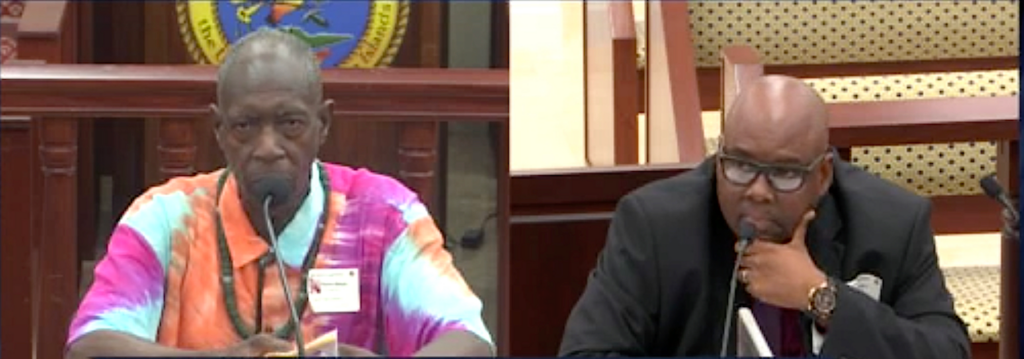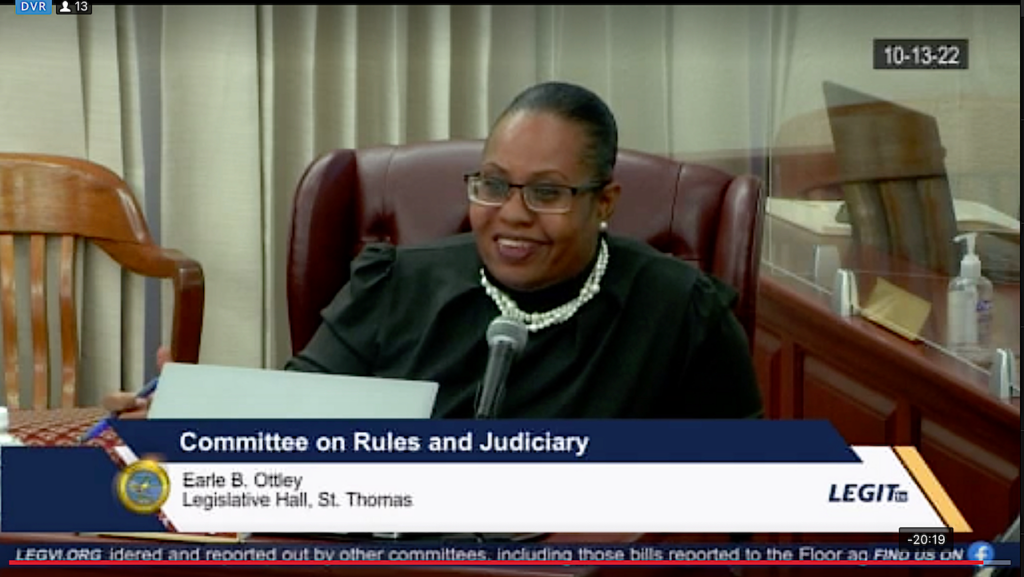
Few names shine as brightly in U.S. Virgin Islands history as Rothschild Francis. While a bust of the early-20th century civil rights activist stands in Educators Park with Edith Williams and J. Antonio Jarvis, so too do his convictions remain on the books.
The Senate’s Committee on Rules and Judiciary approved a bill Thursday asking President Joe Biden to posthumously pardon Francis. The bill now goes before the full V.I. legislature.

Sen. Alma Francis Heyliger (no known relation) introduced the bill that framed a 1924 libel conviction and a 1926 embezzlement conviction as “suspicious.”
With public speeches in his native St. Thomas and bold editorials in his publication, The Emancipator, Francis was both an impassioned booster of the United States and fierce critic of a colonial system that disenfranchised Virgin Islanders.
Rules at the time prioritized strong administration over civil rights and democracy, Heylinger wrote in her bill.
“When you really heard about how he was personally persecuted for trying to correct some of the wrongs in the territory and how it was done, it made you pause. It’s like, wait a minute. This is how they shut people down whenever they tried to be a change agent within any society,” Heyliger said. “For me, this is about correcting a wrong.”
Testifiers Thursday said colonial rulers on the mainland were out to squash any dissent in the newly-American territory.
Edward L. Browne, author of “The Wrongful Imprisonment of Rothschild Francis,” said Francis tried to work within U.S. law to change the application of that law. His advocacy resulted in the Organic Act.
“Rothschild Francis advocated for the removal of the Naval administration and the establishment of a permanent civil government. Mr. Francis believed that racial tension in the Virgin Islands could be eradicated through the application of civil rights and self-governance,” Browne said. “The unjust conviction of Rothschild Francis must be overturned.”
Historian and culture-keeper Glenn “Kwabena” Davis testified Francis was targeted by local police and racist mainland forces.
“This was a man who heard the wailing and lamentations of his people, witnessed the conflagration of assaults, brutal acts of intimidation and violence upon his people, and who swore before the altar of God to give every drop of his blood in the struggle against the perpetuation of naval rule over our Virgin Islands. He pressed forward, undaunted, valiant and focused on civilian government being in the territory,” Davis said. “If ever there was legislation that brought me to euphoric heights, it was this one. By this, a horrible wrong will be rectified.”
Contemporary reports and historical studies paint Rothschild “Polly” Francis, a shoemaker and avid student of American civics, as bucking against injustice from the start of American rule. He’d been an anti-white supremacy activist before that.
Born Oct. 5, 1891, Francis was 25 years old when the United States took over the Danish West Indies. On Transfer Day, Francis reportedly witnessed U.S. soldiers running amok, terrorizing locals with race-based threats of violence, according to historians.
It was not an isolated incident, and Francis used The Emancipator to call out soldier and police officer misconduct, as well as rail against military rule. At the time, the U.S. Navy controlled the USVI government using old Danish West Indies laws — denying Virgin Islanders many of the rights fundamental to American law. It was a confused situation meant to be temporary but stretched on well past the end of the Great War.
Francis put his rights to the test in The Emancipator. When a 1924 editorial called out a police officer’s misconduct — allegedly indiscriminately shooting at a Charlotte Amalie woman’s bathtub and brutalizing another woman with a club — the officer sued for libel.
The case was heard on St. Thomas by Naval Judge George Washington Williams, who twisted legal opinions to refuse Francis’ request for a jury trial. He found Francis guilty.
Francis appealed. In early 1926 the Third Circuit Court of Appeals found the conviction an error: Francis had not named the officer in his article; the officer had outed — and thus maligned — himself by complaining about his description.
Judge Victor Baynard Woolley reprimanded Williams for seeking to control a free press. Woolley saw the case as rife with racism and small-community competition.
“It would seem, on the surface, the trouble in these cases started in a disturbance which occurred one night in a rough quarter of the town of St. Thomas. The real trouble, we surmise, lies deeper and involves political and racial feelings and aspirations,” Woolley wrote.
He said Francis was denied a fair trial.
Fear of legal reprisal didn’t dissuade Francis, who continued calling for civilian rule in the Virgin Islands.
Williams took offense. He found Francis in contempt of court, fined him $100, and sentenced him to 30 days in one of Fort Christian’s prison cells.
The appeals court upheld this second ruling.
It wasn’t the last of legal troubles for Francis. In 1926 and 1927 Francis was arrested on embezzlement charges that Heylinger’s bill called “suspicious circumstances.” He was again in the hands of Judge Williams, who again denied Francis a jury trial. After serving time both on St. Thomas and St. Croix, Francis was free in 1928. He soon moved to New York and died in 1963.
There were others in this era facing trumped-up charges, said genealogist and historian Nadine Marchena Kean.
“In times when you’ve been subjugated or held down for so long, sometimes there need to be a voice that stands, you know?” Marchena Kean said.
She likens Rothschild Francis to the man standing in front of a column of tanks at China’s Tiananmen Square in June 1989.
“When we look at Rothschild Francis, he is that person standing and saying this is wrong,” Marchena Kean said. “Don’t discount us. Don’t treat us as inanimate objects. We’ve gone past that. We have gotten emancipation; we fought for our rights in Fireburn; the poorest and weakest of us all, our co-workers, have struggled for that right to be paid in real money first of all, and then double our salaries for the work we do. We are a people that advocate for ourselves. And we will. And so, even if he had to go to jail, he had to stop that. So, we should honor that — our ancestors who have done that on our behalf.”
This was a time when no one was quite sure how the legal system of the Virgin Islands would work. The territory was a U.S. possession but still operating under Danish law. U.S. Navy administrators were military-minded, not civil-minded. These mainlanders may not have understood Virgin Islanders’ long history of standing up for themselves, educating themselves, and their sense of authority in their homeland, she said.
Historian Filipe Ayala agreed, saying community-minded selflessness exemplified Francis’ generation of Virgin Islanders. It’s something he fears may be sorely scarce in our current society.
“The people of his generation, recognizing the changing time in the Virgin Islands, stood up for the underdog, for the people who did not have a voice. They were about securing the future of next generation of the Virgin Islanders, that they can have a better opportunity. That’s what Rothschild Francis, J. Antonio Jarvis, all of them, D. Hamilton Jackson, all of those men and women, and there were women, too. They stood up to make sure the coming generation would have the best that they didn’t have,” Ayala said.
“A lot of people don’t stand up for what they know is right,” he said. “He stood up for civil rights. In a colonial society, when you think of all the injustices that were happening, he was one of the leaders who stood up for people who felt powerless.”
At the hearing Thursday, Browne suggested the bill to pardon Francis should be addressed to President Joe Biden, not Gov. Albert Bryan Jr. Legal experts at the Senate suggested the bill should go to the attorney general.
The Senate’s legal council, Augustin Ayala, said questions about what laws governed Virgin Islanders at the time of Francis’ persecution made addressing them difficult at best.
“Keep in mind,” the attorney said, “residents weren’t even citizens at the time.”
The bill was amended to address Biden, not Bryan.
Browne also suggested an exoneration — which would clear Francis of any wrongdoing — was better than a pardon, which would forgive the crimes and was a better option. The U.S. president doesn’t have the power to exonerate, however. Only a court could throw out a conviction, Browne said.
“The only crime he committed was loving the Virgin Islands,” Browne said. “Rothschild Francis was the most powerful activist in the 1920s. What Marcus Garvey is to many of us today, Rothschild Francis was then.”
Regardless of where the bill lands, Browne and Davis said if Rothschild Francis were alive today, he’d be working to undo the Insular Cases and establish rent cost controls that could assist local business people.
Davis said the legislation could bring all branches of government — local and mainland — together in collaboration to right other historical wrongs.
“This could be a civics lesson for all of us,” he said.
“Heroes that emerge from the people have to be recognized,” Davis said. “These are our people who have done great for us, and it is now an opportunity to continue to show not only the adults but the young people that they have something on which to build.”
Heylinger said Francis was a point of pride for Virgin Islanders.
“This is the lineage we are built on,” Heylinger said. “I’m asking you to make this wrong right.”





